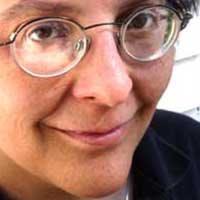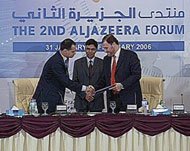
By Quinn Klinefelter Toledo, Ohio29 March 2007
Al Jazeera English presents news and information, but not many Americans are watchingThe Qatar-based, Arabic language television news network al Jazeera is expanding its reach. It recently launched a new English channel. But most U.S. cable operators have declined to carry it. One of the few to buck the trend is in Toledo, Ohio, a city with a large Arab-American population.
Al Jazeera is the first television channel to which many people in the Middle East tune for news about themselves and their region. That's because it is the first all-news channel focusing on their lives from a Middle Eastern point of view, one that's often very critical of U.S. foreign policy.
Americans generally see only excerpts of al Jazeera broadcasts, on U.S. news programs. They're usually scenes of Arab crowds mourning or protesting, or portions of videotaped statements, delivered to the Qatar-based station by al-Qaida or another terrorist organization.
That's led some Americans to associate al Jazeera with terrorism. Al Jazeera officials say they do not air terrorist videos unless they have legitimate news value. They say they want to change the network's negative image in America. So they decided to say it in English.
The network launched a new English-language channel, offering documentaries, current affairs, entertainment and news. It's called al Jazeera English.
But joining the ranks of CNN as a national cable channel will not be easy. A deal between al Jazeera and a major U.S. cable provider fell apart over differences about whether the channel would be carried throughout the country, or only in regions with large Arab and Muslim communities.
Americans can still watch al Jazeera English on the Internet. But as for watching it on the TV screen, only two small cable companies took a chance on the fledgling network: a city-operated system in Burlington, Vermont, and the cable provider serving Toledo, Ohio.
Toledo's Buckeye Cable began showing al Jazeera English this month, and it's too soon to know who's watching it. But on the streets of downtown Toledo, almost no one even recognizes the name al Jazeera.
One of the few exceptions is John Parrish. He knows what al Jazeera is, didn't know its English channel was on cable in Toledo, but says he really doesn't mind either way. "It's a free country," he points out, "freedom of speech, different point of view. I can't see anything wrong with it. If you don't want to watch it, then turn it off."
But others in the city question whether al Jazeera should be available in the U.S. at all. Many echo the thoughts of Toledoan Ed Raymer, a truck driver who says he was passing through New York City on September 11th, when the terrorist attacks occurred.
At a downtown bar, he insists Americans don't need to hear the views of Arabs who are at war with the U.S. "I can see it being okay for the Arab community," he says, "but everybody else, with what's going on over there, shouldn't be subjected to it."
His friend Phil Lazuski predicts, "It's gonna cause a big chaos. If it comes here, it's gonna cause a big chaos."
Lazuski is one of many TV viewers who is not aware that Al Jazeera has already come to Toledo, and has already led to a few angry letters to the editor calling for local subscribers to cancel their cable service.
Vermont cable operators faced a similar outcry when they added al Jazeera to their lineup in December. However, no one in Burlington or Toledo has apparently followed through on threats to cancel their subscriptions.
Still, the passionate community response does not surprise the executive who brought al Jazeera to Ohio. Allan Block, chairman of a small media empire that includes newspapers, some broadcast stations, and Buckeye CableSystem, says the objections indicate a certain bias. "Bias against anything that starts with 'al' and is clearly Arabic."
Block says the royal family in Qatar (an American ally, he stresses) gave his company a sweetheart long-term deal for the rights to al Jazeera English, one that doesn't cost his subscribers any extra fees. He says carrying the channel is a good business decision, and calls charges that he's helping legitimize terrorist propaganda, ridiculous.
"[These people have] the idea that [because] they've had a story on that [had] information leaked to them from al Qaeda, [it] means that it's a terrorism channel! If the Associated Press got the same information that al Jazeera got on any of these occasions, the AP would've handled it the same way and reported it."
In fact, al Jazeera English packed its staff with veteran news people from CNN and the BBC. It even hired respected journalist Sir David Frost. Block says the channel produces extremely credible news, or he wouldn't have included it in his cable line-up. Americans who watch it, he says, should expect a different take on the news from an organization focusing on Arab issues and concerns.
The mosque serving Toledo's large Muslim community was the third mosque built in the United StatesAnd Block adds that gaining a better understanding of the Middle East could bring the American Midwest significant economic advantages. "Particularly if other parts of the country are rejecting this channel, it might show that we're willing to be friends with them. We're willing to reach out."
He suggests that a friendly attitude will encourage investment. "The Midwest that is in recession and has been going through economic decline could certainly use a different kind of relationship with the rich Persian Gulf… with the Persian Gulf that has capital to invest," he adds meaningfully.
Those backing the channel have reportedly invested more than $1 billion in al Jazeera English, with no plans to cut off the cash flow.
Al Jazeera already reaches millions of viewers in Europe, Asia and the Middle East. Company executives say now, they just need to show U.S. cable operators that if al Jazeera English plays in "middle America," it will play in all of America
 TIME magazine (BARRY IVERSON for TIME)
TIME magazine (BARRY IVERSON for TIME)



 By Mindy McAdams (Media Professor )
By Mindy McAdams (Media Professor )



 Its been one month since i signed my contract, and i am still waiting the work visa to qatar home of AlJazeera Network...
Its been one month since i signed my contract, and i am still waiting the work visa to qatar home of AlJazeera Network...


